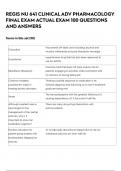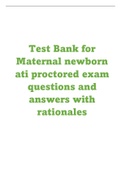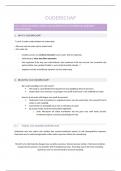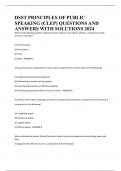Head, B. W., & Alford, J. (2015). Wicked Problems: Implications for Public policy and Management.
Administration & Society, 47(6), 711–739. https://doi.org/10.1177/0095399713481601.................2
Rittel, H. W. J., & Webber, M. M. (1973). Dilemmas in a general theory of planning. Policy Sciences,
4, 155–169. https://doi.org/10.1007/bf01405730.............................................................................8
Roberts, N. C. (2000). Wicked problems and networks approaches to resolution. International
Public Management Review, 1(1), 1–19.............................................................................................9
Dewulf, A., Mancero, M., Cardenas, G., & Sucozhanay, D. (2011). Fragmentation and connection of
frames in collaborative water governance: a case study of river catchment management in
Southern Ecuador. International Review of Administrative Sciences, 77(1), 50–75.
https://doi.org/10.1177/0020852310390108..................................................................................12
Emerson, K., Nabatchi, T., & Balogh, S. (2011). An Integrative Framework for Collaborative
Governance. Journal of Public Administration Research and Theory, 22, 1–29.
https://doi.org/10.1093/jopart/mur011..........................................................................................14
Gray, B., & Purdy, J. M. (2018). Designing Multistakeholder Partnerships. In Collaborating for Our
Future: Multi-stakeholder Partnerships for Solving Complex Problems (pp. 106-137). Oxford:
University Press................................................................................................................................19
Hovelynck, J., Craps, M., Dewulf, A., Sips, K., Taillieu, T., & Bouwen, R. (2020). Relational Practices
for Generative Multi-Actor Collaboration. In The Sage Handbook of Social Constructionist Practice
(pp. 258–267)...................................................................................................................................26
Carson, L. (2017). Deliberation. Research and Development Note 2. Retrieved from newDemocracy,
from
https://www.newdemocracy.com.au/docs/researchnotes/2017_March/nDF_RN_20170322_Delib
eration.pdf........................................................................................................................................29
Chambers, S. (2003). Deliberative Democratic Theory. Annual Review of Political Science, 6(1),
307–326. http://doi.org/10.1146/annurev.polisci.6.121901.085538...............................................30
Escobar, O. & Elstub, S. (2017). Forms of mini-publics. Research and Development Note. Retrieved
from newDemocracy, from
https://newdemocracy.com.au/wp-content/uploads/2017/05/docs_researchnotes_2017_May_nD
F_RN_20170508_FormsOfMiniPublics.pdf.......................................................................................35
Metze, T. (2010). Introduction: Credible Deliberative Governance. In Innovation Ltd: boundary
work in deliberative governance (pp. 15-26). Delft: Eburon.............................................................39
Souza, C. (2001). Participatory budgeting in Brazilian cities: limits and possibilities in building
democratic institutions. Environment and Urbanization, 13(1), 159–184.
https://doi.org/10.1177/095624780101300112..............................................................................42
,Wicked problems = a class of social system problems which are ill-formulated, where the information
is confusing, where there are many clients and decision-makers with conflicting values, and where
the ramifications in the whole system are thoroughly confusing.
Head, B. W., & Alford, J. (2015). Wicked Problems: Implications for
Public policy and Management. Administration & Society, 47(6), 711–
739. https://doi.org/10.1177/0095399713481601
Wicked problems are those that are:
- Complex
- Unpredictable
- Open ended
- Intractable (= onhandelbaar)
History
Critique on rational-technical approaches to policy problems:
- They assume that efficient and effective achievement of objectives can follow from adequate
information, carefully specified goals and targets, and choice of appropriate methods.
Frameworks based on rational-technical approaches came under fire from the 1970s-1980s:
- Systems theory: social and economic problems cannot be understood and addressed in
isolation.
- The major social issues of modern life are grounded in value perspectives, and that gathering
more information for scientific analysis is insufficient to understand and resolve major
problems.
1. The database for rational planning could not supplant the rich experiential
knowledge of professionals concerned to enhance the quality of human services.
2. Technical rationality could not come to grips with the professional norms and
practical knowledge of those who provided valued services to individual clients
experiencing real problems.
3. Technical rationality could not comprehend the experiences of diverse citizens who
are supposed to be helped by these interventions and values underlying their needs
and desires.
4. The development of ever more comprehensive scientific expertise could not resolve
the many difficult policy problems of the modern era. These should be understood as
grounded in competing value frameworks rather than arising from gaps in scientific
knowledge.
- Expert-driven rational comprehensive planning: most public policy programs are now wicked
– they are inherently resistant to a clear definition and an agreed solution. (Rittel & Webber)
Challenges
In more recent decades, some political leaders have remained determined to undertake large
initiatives to address complex problems – even though such interventions might be based on
,imperfect knowledge, and even though the desired outcomes could take many years to emerge. The
methods available to understand and respond to such problems are therefore of great significance.
Concerns about wicked problems have also arisen in relation to dealing with disasters and crises of
various kinds that through into relief the (in-) capacity of governmental systems to prepare,
coordinate, and rapidly mobilize resources. This has called for the adoption of
nontraditional/adaptive/networked strategies to address nonroutine problems. In addition, literature
suggests that many problems are marked by deep-rooted disagreements about the nature and
significance of particular problems and possible solutions. There is no root cause.
It is claimed that the fundamental cause of wicked problems is stakeholder disagreement which
requires reducing conflict through dialogue.
Wicked problems are generally associated with:
- Social pluralism = multiple interests and values of stakeholders
- Institutional complexity = the context of interorganizational cooperation and multilevel
governance
- Scientific uncertainty = fragmentation and gaps in reliable knowledge
Head & Alford (writers of this article) argue that important learning and evaluation processes emerge
from the adaptive management experience of working at multiple levels with a range of policy
instruments. The process of democratic political debate provides a robust testing ground for sifting
the practical merits of options and for assessing support for policy choices.
Complexity, Diversity, and Uncertainty
Dimensions of wicked problems:
- Diversity: multiple stakeholders, multiple goals, multiple interests
- Uncertainty and ambiguity:
1. Uncertainty: lack of knowledge
2. Ambiguity: conflicting views/frames
- Complexity: many interconnected variables, unpredictable changes
Head & Alford propose that it is useful to identify a spectrum of policy times, which would not only
help to explain the features typical of wicked problems generally but which would also shed a light
on the differential features and intensities of different problems.
Heifetz typology of different problem situations confronting managers, ranked in ascending order or
difficulty:
- Type 1: where both the definition of the problem and the likely solution are clear to the
decision-maker. They require technical work on the part of decision-makers and those
subject to their decisions. Tame problems
- Type 2: those where the definition of the problem is clear, but the solution is not, and
therefore learning and discussion are required by both the governmental managers and the
stakeholders they lead. Somewhat wicked problems
- Type 3: both the problem definition and the solution are unclear, and more extensive
learning and discussion are required for all concerned. Wicked problems
, Problems may arise from:
- Intricate interdependencies of processes and structures
- Uncertainties inherent in the dynamic nature of social issues and processes
- The commensurability of potential risks
- The diversity of stakeholders
The authority of science has itself been deeply compromised in the modern context of social media
and values-based political debate.
Head & Alford argue that there are different kinds of wicked problems, and by implication there
could be different types of appropriate responses to them. They argue for a more pragmatic
approach than collaboration, in which the type of response is tailored to the types of wickedness the
problem seems to exhibit.
Shortcomings of public management
Traditional hierarchical forms of public administration cannot deal effectively with wicked problems.
New Public Management (NPM) was introduced from the 1980s to address some of the
shortcomings of traditional administration. They have been ill-suited to deal with wicked problems.
- an approach to running public service organizations that is used in government and public
service institutions and agencies. It was developed during the 1980s as part of an effort to
make public service more “businesslike” and to improve its efficiency by using private sector
management models. It was supposed to address some of the shortcomings of traditional
administration. The approach has been ill-suited to deal with wicked problems.
Managerialism -> managing for results. It entails orienting the public-sector organization’s structure,
coordination mechanisms, financial management, staffing, and rewards toward the achievement of
results, broadly conceived as either sets of program purposes or as groups of people served by
programs. It was modeled on the multidivisional form of leading private-sector corporations, each
with a corporate headquarters overseeing various business units, which it controlled through setting
and monitoring performance outcomes.
Managerialism combines management knowledge and ideology to establish itself systemically in
organizations and society while depriving owners, employees, and civil society of all decision-making
powers. It is a belief in or reliance on the use of professional managers in administering or planning
an activity.
Managerialism cannot deal with wicked problems because:
- Rational-technical approach to making decisions.
1. Rational comprehensive planning: formulating objectives, delineating programs
related to those objectives, setting out outcomes, drawing up action plans,
measuring the extent of achievement. This cannot be done when dealing with wicked
problems.
- Structures and processes through which it implements decisions. Individual managers are
held responsible for specific sets of goals, therefore not seeing that certain goals and
elements can have inherent connections (= fragmentation).









